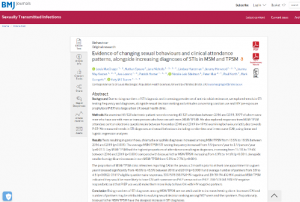Bristol study reveals changing sexual behaviours and increase in clinic attendance and sexually transmitted infections
7 September 2021
A study looking at the impact of PrEP among men who have sex with men and transgender people who have sex with men, has found sexually transmitted infection (STI) diagnoses have increased along with willingness to have condomless anal intercourse.
Pre-exposure prophylaxis for HIV (PrEP) is a medicine for people who don’t have HIV which can reduce the risk of catching it. In the UK, men who have sex with men and transgender people who have sex with men are more exposed to HIV.
Previous research has shown PrEP is safe and effective in reducing the risk of HIV infection. The increased use of PrEP is likely to have played a part in the dramatic decline in new HIV diagnoses in the UK among men who have sex with men. PrEP may lead people to have more unprotected sex, which can lead to an increase in other STIs. People taking PrEP should have regular health checks, including tests for sexual infections. They are encouraged to attend sexual health checks every three months.
ARC West researchers examined trends in bacterial STIs in Bristol among men who have sex with men and transgender people who have sex with men. The team analysed 617 responses to an online patient questionnaire, alongside electronic patient records. These records covered 40,321 clinic attendees between 2016-2019, 3,977 of whom were men who have sex with men and transgender people who have sex with men.
The frequency in which both groups tested for HIV and STIs increased between 2016-2019. In 2016, each patient had an average of 1.5 STI tests a year, while in 2019 this was 2.1. The likelihood of an STI being diagnosed per test also increased across all populations, including among individuals who were recorded to have only partners of the opposite sex. The increase in diagnoses was most significant in bisexual men, which could lead to a rise in STIs in cisgender women.
The reasons for rising STI diagnosis rates are complex and not only the result of increased testing. The proportion of men who have sex with men and transgender people who have sex with men reporting unprotected anal sex rose from 40.6 per cent to 45.5 per cent. The average number of partners reported increased from 3.8 to 4.5.
HIV-positive respondents indicated they would be more likely to have unprotected anal sex with someone if their partner was taking PrEP, while 61.9 per cent of HIV-negative respondents said that if they were taking PrEP, it would make them more likely to have unprotected anal sex with HIV-negative partners.
Louis Macgregor, Senior Research Associate at the University of Bristol and the paper’s lead author, said:
“It’s important to note that an increase in unprotected anal sex is not an unexpected or even necessarily negative consequence of PrEP. Those taking it are likely to consider and re-evaluate their own HIV risk management strategies against competing interests such as maximising sexual pleasure and feeling connected to their partners.
“The challenge is how we approach balancing HIV risk and sexual pleasure with the competing risks of STIs and antimicrobial resistance. The full interplay of increased testing, increasing PrEP use and behavioural changes is difficult to determine.”
Lindsey Harryman, Consultant in Sexual Health at Unity Sexual Health and co-author said:
“The increase in the amount of STI testing suggests that health-promotion messages regarding regular testing when at increased STI risk are working. To tackle the issue of rising STI rates as PrEP is more widely used, we must take a holistic approach which addresses many factors. This includes helping men who have sex with men and transgender people who have sex with men to make informed decisions about the risks of condomless anal sex beyond HIV prevention strategies.
“We now face the challenge and privilege of addressing sexual health messaging in an era of reduced HIV anxiety and fear.”
Paper
